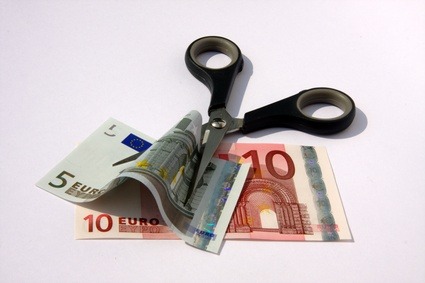The banks have now reportedly agreed for a 40% haircut on Greek debt. Germany and other countries want more even 60%. But wait. This is by no means a reduction of 40% or 60% in the Greek Olympus of debt. It applies only the private sector.
In order for the Greek debt to become sustainable, and the solution to be comprehensive, the haircut should be more even and include another big bondholder – the ECB, part of the “Official Sector”.
France already accepts a 50% haircut. Germany reportedly wants 60% but this is only on the sides. It doesn’t cover everything.
An uneven haircut doesn’t look good
Holders of Greek debt took a risk when buying these assets. The risk is about to be materialized, but not for everyone. Cutting the assets of only private bondholders doesn’t look good. Imagine that the barber cuts the hair only on the sides of the head – not a pretty sight.
A big bulk of Greek debt is held by Greek banks. These banks are already suffering a slow bank run – poor Greek citizens are reducing the money in their accounts for their day to day lives. The rich are moving their money abroad. Some estimates stand on €200 billion euros in Switzerland.
So, a bigger haircut for the private sector spells more trouble for Greek banks.
The ECB also took a risk by buying Greek bonds since May 2010. And contrary to the limited pockets of Greek banks and other bondholders, the ECB has virtually bottomless pockets. If Trichet doesn’t know how to print money, I’m sure Ben Bernanke can help.
Advantages of an even haircut
- A haircut which is more even will look better in the eyes of Greek and other European citizens. This is important given the rage in Greece and in other countries.
- It will make Greek debt more sustainable and will help also in stabilizing the banking system.
- With the participation of the ECB, the level of the haircut be lower, making it easier for an agreement to be reached with the other bondholders.
The most fair haircut would also involve the European EFSF bailout fund and the IMF which gave money to Greece through the bailout program. But this money comes directly from taxpayers. The EFSF is funded by the stronger EU countries, and the IMF is funded by all the world, with the biggest portion coming from the US.
ECB Inaction
The current president of the ECB, Jean-Claude Trichet, has one more week in office. He has been stubborn at times, especially with the rates. On the other hand, he did show flexibility regarding bond buying in several occasions, recently with Italian debt.
He will be replaced on November 1st by Mario Draghi – an Italian. Draghi may accept such a move, but he will be heavily criticized, given that his home country is also in the middle of the crisis.
The second EU Summit on Wednesday is expected to be decisive. But it’s preferable that the leaders will take their time and reach a truly comprehensive deal, rather than celebrating a weak compromise that will not solve the problems – the most likely outcome.
Currently EUR/USD is dragging its feet in anticipation for decisive news. For more on the euro, see the EUR/USD forecast.

